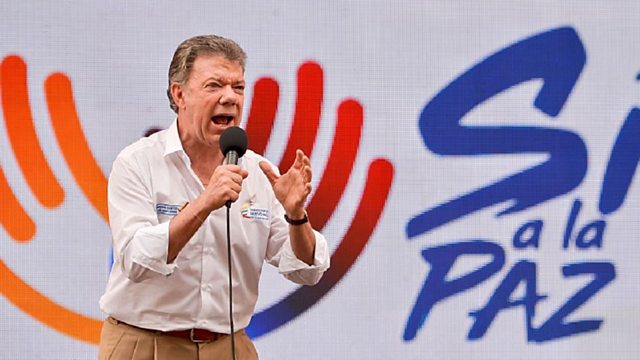Battle Scarred
The lingering effects of civil war in Colombia; why some Armenians saw hostage-takers as heroes; insecurity in Burkina Faso's "jihadi north"; snapshots of modern life in Samoa
Pascale Harter presents tales of war, peace and longer-term struggle from around the world.
Colombia has been riven by civil war for over 50 years - and whole generations have been traumatised by the crimes of leftwing guerrilla groups, rightwing paramilitaries, the nation's military and its drug cartels. But one project's trying to help heal these wounds with drama - by getting former fighters and victims on all sides to work together on stage. Lucy Ash follows this new script for peace in Bogota.
The world's focus on the recent attempted coup in Turkey distracted many people from events over the border in Armenia - but Rayhan Demetrie rushed back to Yerevan to see what was going on, and explains why so many members of the public considered a small band of violent hostage-takers as heroes defending their nation's honour.
Nicola Kelly visits the so-called 'jihadi north' of Burkina Faso - a desertifying land of porous borders, where local civilians and businesspeople feel decidedly threatened by armed groups like Al Qaeda in the Islamic Magreb and Boko Haram.
And finally to more peaceful shores, as Lucy Daltroff sees ancient and modern coexist happily in Samoa - most visibly embodied in a traditional tribal tattooist who Skypes as he inks.
Photo: Colombian President Juan Manuel Santos speaks during the first day of a campaign to inform people about the peace talks between the government and the FARC guerrillas (LUIS ROBAYO/AFP/Getty Images)
Last on
More episodes
Previous
Next
Broadcasts
- Sat 13 Aug 2016 02:06GMTΒι¶ΉΤΌΕΔ World Service except News Internet
- Sun 14 Aug 2016 08:06GMTΒι¶ΉΤΌΕΔ World Service except News Internet
- Sun 14 Aug 2016 15:06GMTΒι¶ΉΤΌΕΔ World Service Online
- Sun 14 Aug 2016 22:06GMTΒι¶ΉΤΌΕΔ World Service except News Internet

